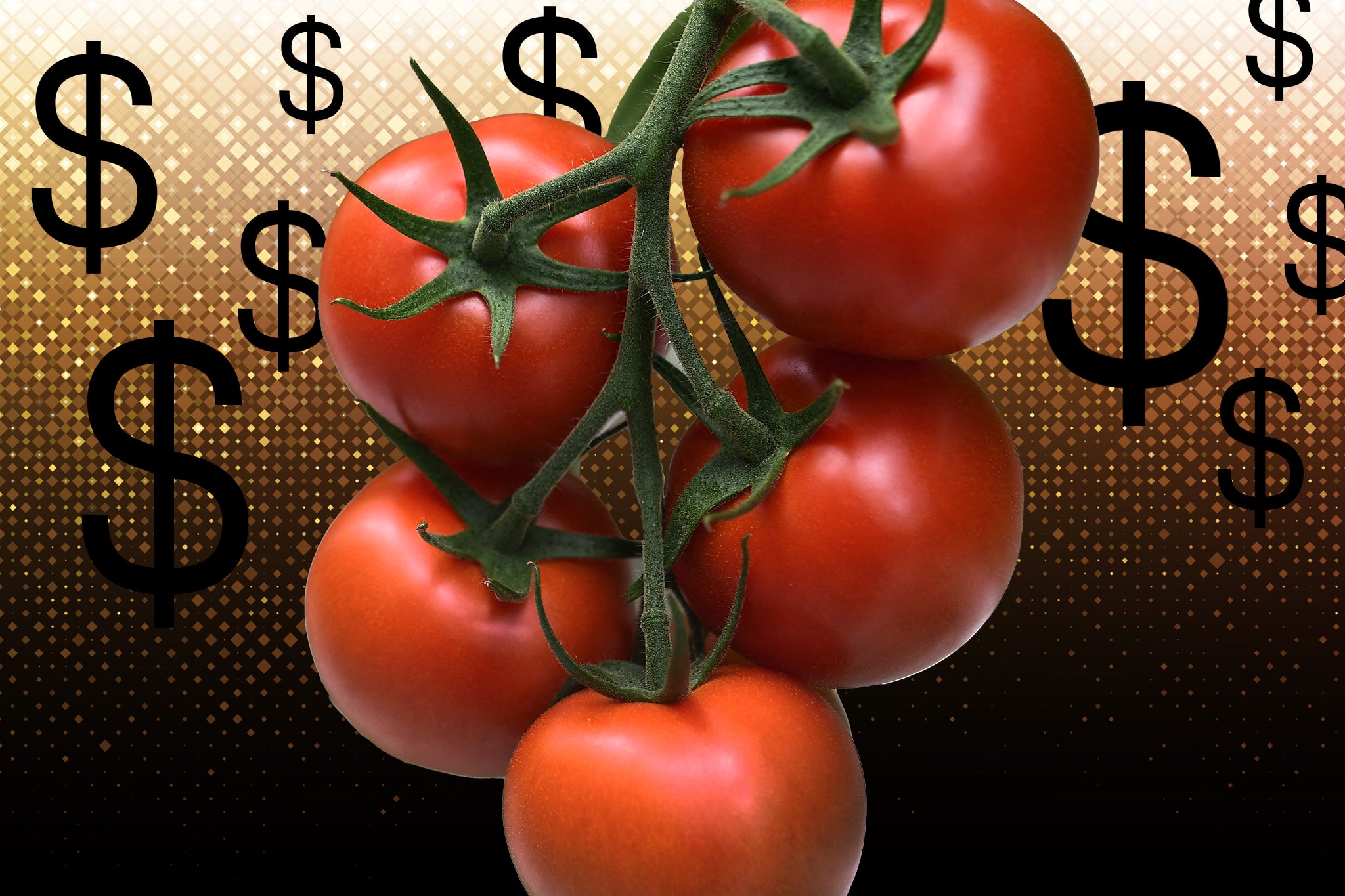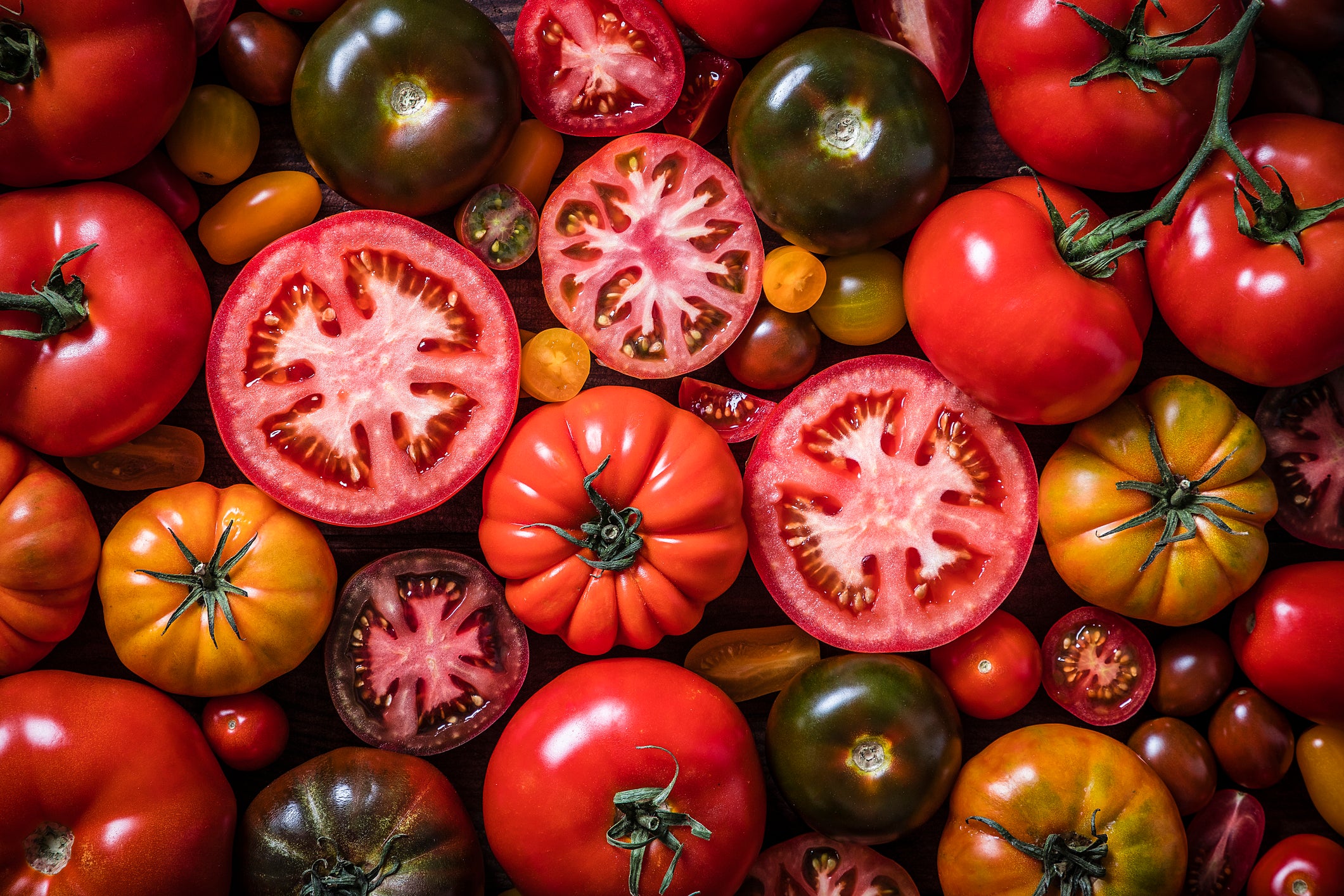The Independent's journalism is supported by our readers. When you purchase through links on our site, we may earn commission.
Nothing says summer like the $10 tomato
Yep, you heard that right – two humble Hamptons tomatoes have just gone viral for costing a shopper there $20. So what is going on, asks food writer Debora Robertson, and could a tomato that expensive ever be worth it?

Going to the Hamptons and complaining about the cost of things is a little like going to Dubai and moaning about the heat. This week, The Wall Street Journal reported on a social media storm that’s fit to knock you off your deck shoes. It concerns the cost of food in this chichi part of Long Island, the summer playground of the American rich and rich adjacent. Tiktoker Tita Loyek (@titatots) went viral after disclosing she’d spent $20 (£15) on two tomatoes.
Admittedly, for some, complaining is as much of a recreational activity as tennis or sailing, with the bonus that it doesn’t require any warm-up or special clothes. So if this is you, don’t hold back. Get your whine on, and in The Hamptons, there’s plenty to whine about.
Instagram and TikTok are alive with well-manicured women in athleisure standing in million-dollar kitchens aghast at the cost of their weekly shop. Well, yes, but it’s not a dozen eggs, a few tins of chickpeas, a bag of pasta, a bunch of bananas and some oven chips, is it?
It’s all $71 boxes of lobster kale salad, tiny $50 tubs of crab mayonnaise, $29 tubs of guacamole and $25 bags of granola. I don’t know, maybe sell a Bentley, a beach house, and turn on your own (imported, hand-built) oven once in a while?
But then, there is for some a comfort, a pleasure in it being so expensive, so organic, so biodynamic, and grown in hallowed dirt, just down the road, on some of the most expensive real estate on the planet.
Things certainly ain’t what they used to be over here, either. Every morning, as sure as the dawn, my social media feed is full of people complaining that a coffee and a sandwich from Pret or Costa cost more than a tenner, and a smoothie from Joe and the Juice cost more than their first flat.
My best friend relayed to me that a perfectly good but ordinary loaf of bread in our old neighbourhood bakery now cost £5.75. Another friend reports that a perfectly normal chicken, no special skills, from the local butcher is now £25.
And of course, sometimes we don’t help ourselves. My friend Mel says, “I was once in Daylesford [a posh grocery shop and deli] and a man rushed in, grabbed four coeur de boeuf tomatoes, went to the checkout and the woman rang up £98. He slapped his card on the Epos and ran out again, got into a Porsche Cayenne and fled. I did a rapid assessment of what was in my basket and approached the till with fear in my heart, ‘Were those tomatoes really nearly £100?’ The woman blanched. Realised she’d rung her till up wrong but it was too late. I guess the moral is that the man buying didn’t flinch. Such is life with a tomato-based emergency in London W11.”

I live in France now, and one of my annoyances is that so many of my English friends think that food here is very cheap. It is not. I am yet to spend €10 on a tomato – in season, they’re very good, plentiful, delicious and relatively inexpensive – but the first cherries will easily set you back €18 a kilo, and for reasons I cannot fathom, a humble cauliflower in my local market often costs upwards of €4.
If the prices weren’t challenging enough, there’s that English fear of embarrassment to deal with too. Every summer, I see visitors approaching the cheese stall in our market as though they’re living out some sort of Year in Provence fantasy. A little brie, some comté, a slice of roquefort, ooh maybe some of those nice little goat’s cheeses, and I can see it coming.
Instagram and TikTok are alive with well-manicured women in athleisure standing in million-dollar kitchens aghast at the cost of their weekly shop
The rosy-cheeked man behind the counter shows them a receipt for €80-ish, and suddenly this simple lunch of a baguette and a bit of cheese isn’t quite the humble snack they had planned. Meat is expensive too, even those cuts we used to think of as “cheap” such as oxtail and beef cheeks, and don’t even get me started on lamb. It won’t be cheap, but it will – almost definitely – be good.
There is no question that the cost of food has increased enormously in the past few years, for myriad well-explored reasons, from labour, to climate change and crop yields, to the costs of retail premises. In the USA and the UK, grocery costs have gone up over 20 per cent since the beginning of Covid.

Until quite recently though, our groceries were, in relative terms, among the cheapest in the world. In the UK, they represented only 8 per cent of our total household expenditure, less than any other country apart from the USA and Singapore, and 8 per cent less than the EU average.
In 2018, an ONS report showed the proportion of household income we spent on food had actually halved since the Second World War. So, what we might be coming to grips with is that producing food in volume, ethically, and sustainably, is going to cost us more than we have been used to paying in our lifetimes. A handbaked unprocessed loaf from a local bakery is going to hurt your wallet, but the lack of chemicals could be a saving in another way. We may now have to decide what price we want to pay.
While $10 Hamptons tomatoes are a summer joke, a good opportunity to laugh at the spoiled this-is-how-we-lobster-roll set, how much our food is going to cost us is a sobering thought. As far as cheap food is concerned, the holiday is most definitely over.
Debora Robertson is the author of ‘Notes from a Small Kitchen Island’ and is on deborarobertson.substack.com.





Join our commenting forum
Join thought-provoking conversations, follow other Independent readers and see their replies
Comments